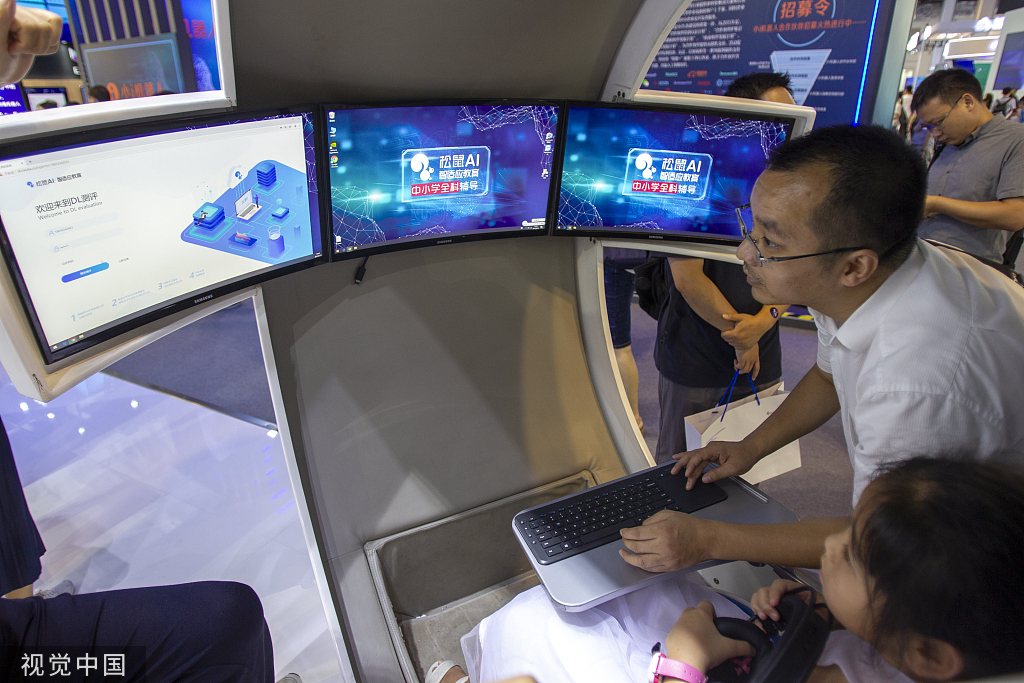'AI+': The core of future online education?
- By Mathew Wong
 0 Comment(s)
0 Comment(s) Print
Print E-mail China.org.cn, November 1, 2019
E-mail China.org.cn, November 1, 2019

The importance of education cannot be overstated, for societies and individuals alike. This fact has developed hand-in-hand with increasingly competitive examinations and a maturing education industry. It is well known that Chinese students face immense pressure from above and fierce competition with their peers. Recent statistics show that in 2019, the number of students who took the gaokao, China's standard college entrance exam, soared to 10 million; yet less than 20% of them are able to be admitted to the key "Project 985 & 211" universities.
The process subjects not only students themselves to great stress, but parents as well, causing them to become obsessed with helping their children gain the best possible start.
This competitive backdrop has given rise to online education industries, such as Hexiaoxiang, a Chinese online education start-up, which announced that it completed its financing round of 200 billion yuan in August. It is reported that the new funds will be used in AI technology upgrades and course research.
The Chinese education industry is characterized by abundant potential and a massive pool of students at all levels, from elementary to tertiary, and this is found in compulsory as well as extracurricular education. A report from the China Institute for Educational Finance Research estimates that after-school class spending now accounts for around one-third of total household spending, and more than half of students attend supplemental courses after school. Under the long-standing exam-based system, how can online education start-ups hope to compete with or even eclipse this "orthodox" model?
Compared with traditional education platforms, which have the primary goal of helping students survive standardized exams, online education attempts to provide customized, stratified courses for children aged from 3 to 12. These online courses facilitate an interactive relationship between teachers and students and ambitiously promote so-called EQO (essential-qualities-oriented) education, especially with the assistance of AI. Instead of replacing teachers, it is suggested that AI can decrease the burden placed on teachers, who can concentrate on teaching itself and pedagogy, as well as looking after students.
Computer-based teaching, in fact, is not new in China, particularly in cities where each classroom has been facilitated with at least one computer and students today are used to learning by means of electronic devices. However, with the "AI+" education model, big data comes to play a vital role in gleaning, analyzing and modeling student results to provide accurate feedback to educators and help predict students' learning and memory curve.
One striking advantage of AI-assisted interactive courses is that students gain a sense of achievement and may be, therefore, more willing to take on new challenges, rather than becoming overburdened by stacks of exercise books. A Chinese course, for instance, may be designed to include elements of calligraphy, ancient Chinese poetry, writing and reading comprehension, and would expose students to real-life scenarios through cartoons. The AI element tests students and helps them effectively meet learning outcomes. During this process, AI teachers assign students customized tasks so that they can share and exchange their learning. In this way, students gain initiative and are internally motivated. This ability of online platforms to utilize student data to provide better AI feedback and supervision is the crux of the effectiveness of such learning environments.
More parents today are starting to accept the approach of online education platforms. Apart from the interactive and instructive benefits, online courses can save money and time. For parents who are busy working, online options undoubtedly beat shuttling their children from school to various other educational institutions. Moreover, the online education model has been bolstered by recent government policies that aim to promote "Internet+ education" throughout China, with the goal of increasing equality of educational resources.
Admittedly, even as AI empowers the online education industry, the AI+ education model is still in its infancy and has a long road ahead to develop into maturity. One challenge is popularization – after all, for most parents the priority is how quickly this novel approach will be reflected in exam scores and have a direct impact on helping their children lead among their peers. And despite the goal of equality, it is worth asking whether such developments will put students from less privileged backgrounds, who cannot afford technological resources, at a further disadvantage in the education system.
Mathew Wong is an Assistant Professor in the Department of Social Sciences at the Education University of Hong Kong.
Opinion articles reflect the views of their authors only, not necessarily those of China.org.cn.
If you would like to contribute, please contact us at opinion@china.org.cn.






Go to Forum >>0 Comment(s)